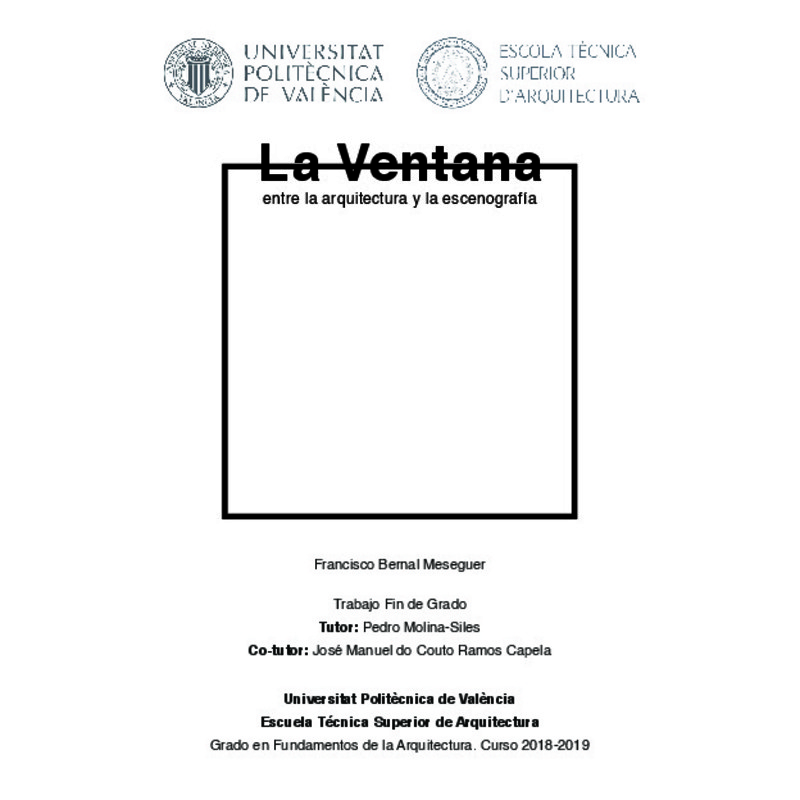JavaScript is disabled for your browser. Some features of this site may not work without it.
Buscar en RiuNet
Listar
Mi cuenta
Estadísticas
Ayuda RiuNet
Admin. UPV
La ventana: entre la arquitectura y la escenografía
Mostrar el registro sencillo del ítem
Ficheros en el ítem
| dc.contributor.advisor | Molina Siles, Pedro Javier
|
es_ES |
| dc.contributor.advisor | Do Couto Ramos Capela, Jose Manuel
|
es_ES |
| dc.contributor.author | Bernal Meseguer, Francisco
|
es_ES |
| dc.date.accessioned | 2019-10-25T14:13:28Z | |
| dc.date.available | 2019-10-25T14:13:28Z | |
| dc.date.created | 2019-07-18 | |
| dc.date.issued | 2019-10-25 | es_ES |
| dc.identifier.uri | http://hdl.handle.net/10251/129699 | |
| dc.description.abstract | [ES] Una ventana es una abertura en un muro o pared cuyo fin último es servir como medio a través del cual mirar y proporcionar luz y ventilación. Ahora bien, centrémonos en mirar . Una ventana permite la conexión visual entre dos ambientes, generalmente un interior con un exterior. Así, el marco de la ventana es, por lo tanto, un marco que encuadra una escena cotidiana. Algo parecido ocurre con la cuarta pared en el cine y el teatro, siendo esta la pared imaginaria que cierra la caja escénica y a través de la cual la audiencia ve la actuación. ¿Se podría decir entonces que la ventana es la cuarta pared en arquitectura? Pues es un elemento que, al asomarnos, nos permite experimentar sensorialmente lo que está ocurriendo al otro lado. En este trabajo analizaré la ventana como elemento constructivo en la arquitectura hasta su uso en la escenografía cinematográfica y teatral. | es_ES |
| dc.description.abstract | [EN] A window is an opening in a wall whose ultimate purpose is to serve as a way to see through and as a source of light and ventilation. Now, let s focus on seeing . A window allows the visual connection between two environments, usually an interior with an exterior. Thus, the window frame is, therefore, a frame that encloses an everyday scene. Something similar happens with the fourth wall in the cinema and theatre, being the imaginary wall that is closing the stage box and through which the audience sees the performance. Is it possible to say then the window is the fourth wall in architecture? It is an element that, when we look through it, allows us to experience sensorially what is happening on the other side. In this work I m going to analyze the window as a constructive element in architecture until its use in cinematographic and theatrical scenography. | es_ES |
| dc.format.extent | 131 | es_ES |
| dc.language | Español | es_ES |
| dc.publisher | Universitat Politècnica de València | es_ES |
| dc.rights | Reconocimiento - No comercial (by-nc) | es_ES |
| dc.subject | Ventanas | es_ES |
| dc.subject | Arquitectura | es_ES |
| dc.subject | Iluminación | es_ES |
| dc.subject | Escenografía | es_ES |
| dc.subject | Cine | es_ES |
| dc.subject | Teatro | es_ES |
| dc.subject | Windows | es_ES |
| dc.subject | Architecture | es_ES |
| dc.subject | Lighting | es_ES |
| dc.subject | Scenography | es_ES |
| dc.subject | Cinema | es_ES |
| dc.subject | Theatre | es_ES |
| dc.subject.classification | EXPRESION GRAFICA ARQUITECTONICA | es_ES |
| dc.subject.other | Grado en Fundamentos de la Arquitectura-Grau en Fonaments de l'Arquitectura | es_ES |
| dc.title | La ventana: entre la arquitectura y la escenografía | es_ES |
| dc.type | Proyecto/Trabajo fin de carrera/grado | es_ES |
| dc.rights.accessRights | Abierto | es_ES |
| dc.description.bibliographicCitation | Bernal Meseguer, F. (2019). La ventana: entre la arquitectura y la escenografía. http://hdl.handle.net/10251/129699 | es_ES |
| dc.description.accrualMethod | TFGM | es_ES |
| dc.relation.pasarela | TFGM\106354 | es_ES |
Este ítem aparece en la(s) siguiente(s) colección(ones)
-
ETSA - Trabajos académicos [4687]
Escuela Técnica Superior de Arquitectura






